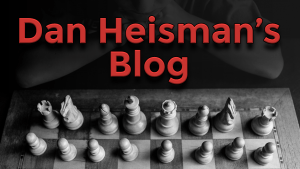Q&A with Coach Heisman Jan 10, 2014
"What rules do you break the least (most)?"
I'm a US Chess Federation Senior Tournament Director, so I try not to break any rules at all! For example, I never move my knights like bishops and I press my clock after each move. But I think the questioner was using "rules" as in Alburt and Lawrence's Chess Rules of Thumb, which are really principles, guidelines, or heuristics.
Principles are meant to help you figure out what to do when you don't know what to do and especially when you can't figure it out. However, if careful analysis shows move X is the best move, then you don't need a principle. As I once told student (now Cornell Professor of Economics) NM Dan Benjamin "I don't care what you know about chess; if you see a move that wins, just play it, no matter how many principles it breaks!"
Most principles tell you how to do things, or which things to favor, but these pieces of advice come in all flavors. Some are analytical principles, which tell you how to think, but not what to do. I know some players mis-apply analytical principles to make move choices in slow games. For example, they might explain "I am going to recapture this way because it's a check" as a substitute for careful analysis. However, in this case what the principle about checking meant was to analyze the checks first (for efficiency), since they are more forcing, not to play them without analysis when a non-check might be better. Much more on this subject in Principles of Analytical Efficiency.
In order to better explain which principles should be most followed, I created a two-dimensional way of looking at guidelines: strong vs weak and important vs non-important. A strong principle is one that is closer to a rule: fewer exceptions; conversely, a weak principle is one with many exceptions. On the other hand, an important principle is one that comes up often (and thus is important to know) or one that, if not followed, can easily lead to disaster. Not all strong principles are important or vice versa. Again, much more on this at Strong Principles vs. Important Principles.
Finally we are ready to answer the question about which "rules" to follow most. GM Soltis, in GM Secrets: Openings, suggests that the strongest opening principle (the one with the fewest exceptions) is Develop your rook onto the same file where your opponent has developed his queen. Interestingly, this often works even if that file is currently closed (has pawns of both sides) so long as the pawn structure is dynamic and could open (or semi-open) in the middlegame.
Off the top of my head, I picked out the principle I violate the least as "As soon as it is safe, activate the king to fight in the endgame." The king has a fighting value of 4+ pawns so, unless you are ahead a rook or more, it's usually quite disastrous to not use (or even strongly delay) getting the king into the game. Of course, there may be tactical reasons why you might delay this activation slightly, but there are almost always tactical exceptions to any principle (hence my advice to Dan). I tend to think of the activation of the king as just following the uber-principle "Use all your pieces all the time". Not doing so early in the game is simply an exception due to king safety and, as soon as the reason for that exception goes away, it is just as vital to activate the king as it was to activate the rest of the pieces in the opening.
"How do you beat Magnus Carlsen?"
The first step is to get to play him! I think Carlsen is due to play a simul in Las Vegas, so if you are one of the lucky ones that have been invited to play, you've at least got a shot. If you're not playing him in a simul, then that probably means you are already a super-GM, since Carlsen mostly plays in Super-GM tournaments and you are not likely to face him in Round 1 of the US Open (unless the sponsor wants to pony up quite an appearance fee!).
That means the first thing you would normally need to have a chance to beat Carlsen is a rating of about 2750+ FIDE so that you have a shot at facing him. Once you get that far, then playing really well and hoping Carlsen has a bad day would be very helpful (see Luck in the Sport of Chess). World Champions may be the best player on the globe (not always...) but they are hardly unbeatable.
Of course, if you are allowed to cheat or use a computer, using Komodo, Stockfish, Houdini, Rybka, or any other top engine (rated about 3200) makes Carlsen's defeat all the more probable. Fischer never had that problem. And maybe, if Carlsen keeps his defeats to a minimum, we may someday find a book about beating him similar to Mednis' How to Beat Bobby Fischer. You have to be really good to get a book out featuring your few defeats! 
One player noted his FM coach has a certain training regimen and wondered what I thought about it. There's many ways to skin a cat - and many paths to chess mastery. Almost all these paths will contain some similar elements (see Every Good Chess Player...). Another viewer asked "Which is more important in becoming a top player: hard work or great talent?" While I said both were necessary, if backed to a wall, I guess I'd choose "hard work".
But that means the FM's - or anyone's - training regimen would work best on highly talented players and those willing to work hard. So long as his regimen is reasonable (it may or may not be similar to how I help my stronger students), then it's likely it will help his better students as it helped him, assuming he is having them do many of the same things that also helped him get to FM.
It's great these days that pretty much any chess player, if he has the resources, can take lessons from any "internet-accessed" instructor around the globe. I give lessons to players from Australia to Spain to Mexico, and so can anyone else. So if you want to take lessons from a famous trainer like IM Mark Dvoretsky, it may be possible, whereas before the internet age it was much more difficult.
Similarly someone asked why the West had fewer super-great players like Fischer and Carlsen. It certainly helps if your government, like the USSR did, supports chess! Many a talented Western player, like Ken Rogoff, decided to become something else (in his case a top economist), than a top GM. Hopefully Carlsen will be a great good-will ambassador for chess, although due to the requirement to periodically defend his crown, it is doubtful he will stay at the top for 26-27 years, as Steinitz and Lasker did. They were able to pick their own challengers, a right that Capablanca found frustrating when he lost to Alekhine and then was never able to get the next World Champion to grant him a re-match.
All my Chess.com articles about the show can be found at the bottom of the page at this link (the upper part of the page is the remainder of my Chess.com blogs and articles). Almost all my articles, by subject, can be found at this link.
The next show on Jan 24 probably will also be open to all members.



